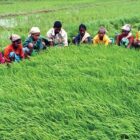It is time for the country to undergo a deep introspection into the causes of farmland suicides because they are not prompted by natural calamities but by a man-made malady.
October 16, celebrated as “World Food Day” was when policy makers from across the world gathered at the Milan Expo 2015 in Italy. Despite being an invited panellist, one had to decline because this is hardly the time for an Indian farmer to celebrate food, given the inexplicable insensitivity with which India treats the everyday farmer suicides, placing the country in the same league as sub-Saharan Africa. The time was better spent with farmers in Odisha.
After nearly 70 years of Independence, the government is still trying to feed farmers cheap grain and failing at that as well. The permanent redistribution of resources is not a sound strategy. Rather than demand a seat at the Security Council or claim to rival China, it is time for the country to undergo a deep introspection because farmland suicides are not caused by natural calamities. They are a man-made malady, a creation of policy; past and present
Back-to-back droughts have negated all progress or claims thereof. They have exposed all the false promises of politicians and policies. Travelling through Maharashtra for three days provides an opportunity to go on a pilgrimage to Papal, the village of the founder president of the Bharat Krishak Samaj, Dr Panjabrao Shamrao Deshmukh, agriculture minister in the first cabinet of Pandit Jawaharlal Nehru in 1952. Regrettably, his home is in a state of utter neglect, just like his home state, Maharashtra, which is the epicentre of farmer suicides in the country
Water is the scarcest commodity of all. Sugarcane farmers consume about half of Maharashtra’s water but farm only six per cent of the land. Governments in the past have promoted such policies as political expediency has taken precedence over farmer lives. What is shocking is that farmers are taking their lives every day in a functioning democracy, not in a banana republic.
It is equally ironic that while farmers with assured means of irrigation supported by government programmes like input subsidies or purchase mechanisms like minimum support prices loudly complain about low prices, the majority of farmers in rain-fed farms, who do not get to avail of farm subsidies nor receive an MSP for their produce, never raise their voice. The fear of losing something ignites more passion than the desire to attain something new.
At the other end of the spectrum from Maharashtra is my home state of Punjab, where farmers are protesting low prices of paddy and the decimation of 80 per cent of the state’s cotton crop due to the ‘white fly’ pest attack. The pest attack is widely attributed to spurious pesticides supplied by the government, purchased with funds received by the state government for cotton demonstration plots. The funds were to be used to demonstrate better practices to farmers in every cotton growing village in the state.
Clearly, the farmers are held in a stranglehold by the powerful cartels. Agro-industrial conglomerates — fertiliser, seed and pesticide companies on the one hand and food-processing companies, procuring and processing farm produce on the other — control the entire space and prices of agricultural produce as well.
To make things worse, international commodity markets are in a tailspin. No Indian economist or commodity trading house had predicted the bloodbath. The crisis of falling prices underlines the inability of a government to control prices in a flat, connected world. What is also apparent is the limited government role in controlling commodity prices in the short term. The Indian government probably purchases less than 10 per cent of the farm produce. Indian economists are exhorting the government to abandon its purchase programmes altogether.
Just as farmers do not fathom the adverse consequences of not being signatories to international trade agreements, government officers and policy makers do not realise the disastrous consequences of agreements they sign without understanding the long-term implications. The act of one generation or one government is often fatal for many generations of farmers. Agriculture is local but the consequences of subsidies in one nation are global. That is why India has to participate professionally in trade negotiations. Times are going to get more challenging if India does not manage to change the politics of food.•




